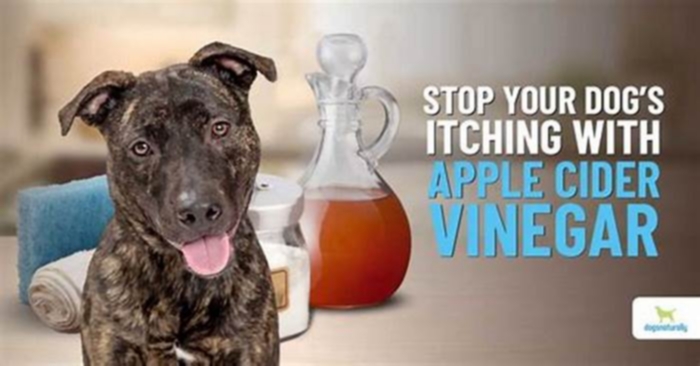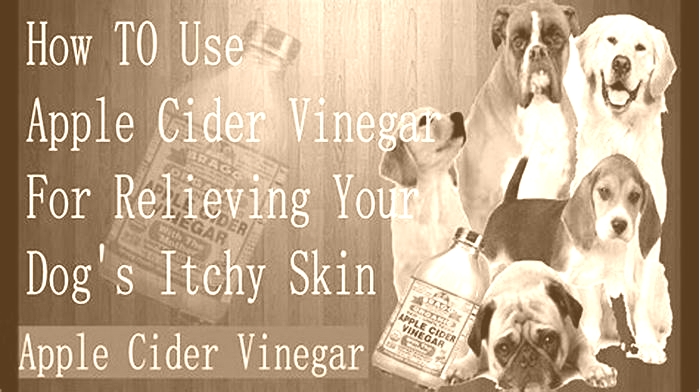How often should I spray my dog with apple cider vinegar

How Often Should I Spray My Dog with Apple Cider Vinegar?
Apple cider vinegar has antibacterial and antiseptic properties. It is highly acidic and is famous for spraying furry pets such as dogs. Every dog owner should conduct proper research and do a patch test before using any home remedies for their dogs. If you are wondering how often you can spray your dog with apple cider vinegar and if it is safe or not, you are in the right place.
Spray apple cider vinegar once a week on your dogs skin. Its disinfectant and antibacterial properties reduce itchiness, prevent fleas, body odor, and yeast allergies, relieve ear infections, and make your dog feel relaxed. Dilute apple cider vinegar with water before spraying your dog.
You must know what is the right amount of apple cider vinegar for your dog before putting it on its skin or adding it to your dogs diet. Apple cider vinegar can cause some side effects if not used correctly. So, lets learn how to use apple cider vinegar for dog skin, the recommended dosage, its benefits, and its side effects!
Key takeaways
Apple cider vinegar (ACV) is a natural remedy that can be beneficial for your dogs health and hygiene.Regular sprays of ACV on your dogs coat can help keep fleas and ticks at bay, soothe skin irritations, and improve coat shine.The recommended frequency for spraying ACV on your dog is once a week, but this can vary depending on the dogs skin condition and needs.Always dilute ACV with water before spraying it on your dog. A good rule of thumb is a 50:50 ratio.ACV is safe for most dogs, but its always a good idea to do a patch test first to check for any skin reactions.Never apply ACV to open wounds, and avoid spraying it near your dogs eyes and ears.For internal use, always consult with a vet for the correct dosage and to ensure its safe for your dog.While ACV has many benefits, it is not a substitute for regular veterinary care or prescribed medications.
Is Apple Cider Vinegar Good For Dogs Skin?
Pet owners should only use natural remedies having proven and beneficial actions. Apple cider vinegar is one of those substances available at home that helps dog owners in many ways. For centuries, natural remedies including ingredients like ACV have been common for treating pesticides and itchiness.
Apple cider vinegar is safe to use on dogs skin. However, you should make sure that it is raw and organic. Any preservatives present in ACV may kill the advantageous enzymes of ACV. The dog skin requires these enzymes for fighting yeast and other problems.
Moreover, the ACV should be free of any other chemical compounds that might do more harm than good to the dogs skin.
The disinfecting and cleaning properties of ACV prevent many skin issues in dogs. It is safe for topical use but you have to dilute it.
The thing is: Undiluted apple cider vinegar is too strong for the skin.
How Often Should I Spray My Dog With Apple Cider Vinegar?
Apple cider vinegar is strongly acidic having a pH of 2-3. Pure apple cider vinegar may cause burns on the dogs skin. Therefore, you should dilute it in water.
Using apple cider vinegar on a dogs skin every day is damaging to it. Whether you dilute ACV or not, you shouldnt use it on dog fur or skin daily. If your dog is suffering from yeast, itch, fleas, or irritation, spray apple cider vinegar once a week on your dogs fur.
For visible results, keep apple cider vinegar on dog fur for at least 15 minutes. Do this once a week to prevent fleas and irritation.
The recommended dosage for using ACV on a dogs skin is 1 part ACV and 2-4 parts water. The amount of dilution depends upon the seriousness of the issue you are treating.
As apple cider vinegar has highly acidic properties, a small amount of it is enough for keeping fleas and infections away.
Dont make it a routine to spray apple cider vinegar on your dog every week. Only use this natural remedy to treat specific problems mentioned below. When the problem is treated, you can spray ACV occasionally on your dog.
Benefits Of Apple Cider Vinegar For Your Dogs Skin
A dog can benefit from apple cider vinegar spray in multiple ways. But remember to not spray on open wounds as the apple cider vinegar might cause burning and irritation. You should use the recommended dosage of ACV for your dog for a safe experience.
Below are mentioned the top benefits of apple cider vinegar for your dogs skin. So, lets find out!
Relieves Skin Allergies or Itchiness
Apple cider vinegar not only treats yeast allergies but also prevents them in the future. It reduces yeast growth on the dogs skin. So, you can spray it directly on the dogs skin and fur to relieve itchiness.
Yeast infections can cause wounds. So, make sure that these wounds are not open and raw while spraying apple cider vinegar on the dogs skin.
Natural Flea Repellent
The smell of apple cider vinegar stays on dog fur for a long time. Even if you rinse it off, the odor will stay there. It acts as a natural flea and pest repellent and keeps your dog safe from flea infestation.
Having fleas in the fur of pets is the biggest problem that pet owners face. If you are one of them, try spraying apple cider vinegar on your dogs fur.
Prevents And Cures Ear Infection
The buildup of wax or gunk around dog ears is a sign of ear detoxification. If the wax doesnt make the dog uncomfortable or causes any itching, you should leave it alone.
In case your dog is constantly itching its ears due to the wax buildup, clean the ears with apple cider vinegar. Dilute it in water and spray it on a cotton ball. Gently clean the ears of your dog with the cotton ball.
Note: Never pour apple cider vinegar directly into the ears of your dog.
Eliminates Doggie Odor
Apple cider vinegar restores the pH of a dogs skin and acts as a natural odor eliminator for your dog. If your dog smells funny and bathing doesnt help, try spraying apple cider vinegar on your dog. Do this after bathing your dog.
The odor of ACV will keep your dog smelling fresh for a good amount of days while keeping the fleas and infections away.
Helps To Soothe Hot Spots
Apple cider vinegar has cooling and soothing properties. Hot spots form after itching constantly. You can prevent this itchiness by spraying apple cider vinegar on your dog. It will prevent further infections, restore the skins pH, soothe hot spots, and make your dog feel relaxed and comfortable.
Reduces Irritation Of the Paw
The antiseptic and antibacterial properties of ACV come in handy for an irritated dog paw. Dog paws come in contact with various bacteria that can cause infections or irritation on the paw. It makes the dogs feel uncomfortable.
ACV is a good solution to ease an irritating dog paw.
Heres the proper dosage for using apple cider vinegar for dogs as well as some more advantages of apple cider vinegar.
Tips To Safely Spray Your Dog With Apple Cider Vinegar
Administering more than the safe dosage of apple cider vinegar topically or through the mouth of your dog can be harmful. Therefore, you must know how to properly use apple cider vinegar for a dogs skin. So, lets see the step-by-step guide to spraying apple cider vinegar on your dog safely!
Step 1: Make a Spray
Add 1 part of apple cider vinegar to 2-4 parts of water. Put both substances in a spray bottle. Shake the bottle and make sure everything is properly mixed.
Step 2: Give Bath to the Dog
Before spraying the dog with apple cider vinegar. Bath it with your dogs favorite shampoo. Make sure all the shampoo is out of the dogs fur.
Step 3: Spray ACV on Dog
After giving your dog a nice bath, spray the ACV solution on your dogs skin and fur. Rub it on the skin.
If you are treating skin allergies using ACV, make sure the solution comes in contact with the skin. Dogs with hefty furs need special attention during this step as the fur can come in the way.
Let the ACV sit on your dogs skin for at least 15 minutes.
Step 4: Rinse with Water
If your dog is sensitive, rinse the ACV with water after some time. You can do a 24-hour patch test before using apple cider vinegar on your dogs skin.
Various Side Effects Of Apple Cider Vinegar For Dogs
Using too much apple cider vinegar may have some adverse side effects for your dogs. Some of the common side effects include:
- If you are adding ACV to the dogs diet, it can cause gastrointestinal problems such as constipation, diarrhea, vomiting, nausea, etc.
- Undiluted or higher concentrations of ACV than water can cause chemical burns on a dogs skin.
- Too much ACV can irritate the skin of your dog instead of soothing it.
- Any open wounds on your dogs skin can become worse after spraying ACV directly onto them.
Heres a chart for a safe dosage of ACV for ingesting by dogs! You can add ACV to your dogs food for different benefits.
Dog Weight | Quantity of ACV |
|---|---|
15 lbs | 1 tsp. |
16-35 lbs | 2 tsp. |
36-84 lbs | 1 tbsp. |
Final Thoughts
Now that you know how often you can spray your dog with apple cider vinegar, you can safely treat problems like allergies caused by yeast, itchy skin, itchy ears, irritated paws, unbalanced skin pH, etc. the key is to use the right amount of ACV otherwise it can do more harm than good for your dogs skin. Diluting ACV is important before spraying your dog with it as it is highly acidic.
Apple cider vinegar for dogs: benefits vs. risks
Is apple cider vinegar safe for dogs?
Yes, ACV is safe for dogs in small doses, just make sure to dilute your apple cider vinegar the right amount, generally 50/50 with water for topical uses and mixing it with drinking water or food for dietary uses. Follow the recommended oral dosage based on your pups weight.
Are there any risks or side effects?
Some dogs can have an allergic reaction to apple cider vinegar, so its important to watch for signs of irritation on their skin. A sudden intake of the acidic ACV can cause vomiting, diarrhea, or other digestion problems. When taken internally, start with small amounts and monitor your dog for signs that they cant tolerate it.
What kind of apple cider vinegar should you buy?
When buying apple cider vinegar for yourself or your dog, its best to look for raw, organic, and undiluted apple cider vinegar with the mother included. This ensures that what you get is free of pesticides that can be harmful when ingested or used topically.
How much apple cider vinegar can I give my dog?
Oftentimes, vets base an ACV dosage recommendation on the dogs weight. Review our recommended dosage chart above for guidelines on whats a safe amount to offer your dog according to their size.
Can I Spray My Dog with Vinegar and Water? (Answered)
Dogs are the perfect companion for someones family and themselves. Treating them well also comes as a consideration as any other family member. Vinegar is used in treating various health factors of animals and pets.
Well guide you with the uses of vinegar and water spray, their benefits, and safety measures with dogs.
Can I spray my dog with vinegar and water?
Dogs can be sprayed with vinegar and water. The acetic acid in it acts as an anti-bacterial and microbes-free, anti-fungal agent. Both white vinegar and apple cider vinegar mixed with water can be used as a spray to remove fleas, odor, and other infections.
Vinegar is an acidic substance. White distilled vinegar and apple cider vinegar are used in cooking. So, they are entirely non-toxic and edible, meaning it wont be a problem if the dogs ingest them.
Their acidic trait makes them bacteria and microbes free. They are also anti-fungal; they will clean any kind of moles as well.
Vinegar has a very distinct smell, and they taste sour. It makes them a promising agent for cleaning and removing any bad odors that always come with living with a canine.
Vinegar has a number of benefits. It can also be used as a digestion aid, helping with infections, hot spots and, most importantly, keeping them bugs and fleas free. Vinegar and water solution or a spray are the best solutions to these mentioned remedies.
White vinegar and water:
White or distilled vinegar is made from the fermentation of grain alcohol. It contains 4-7 percent acetic acid and has 93 to 97 percent water.
It has a very sharp sour taste with a bit of fizz. It is mainly used for baking, cooking, or cleaning vegetables.
White vinegar has good anti-microbial properties making it a good repellant and cleaner around the house. White vinegar and water could be made into a spray for a flea repellant of the dogs.
Apple cider vinegar and water:
Apple cider vinegar is made from crushing and extracting the liquid from the apple and later fermenting.
The fermentation gives it a pungent smell. It has 5 to 6 percent acetic acid, making it less acidic than white vinegar and 94 to 95 percent alcohol.
It is used as a salad dressing also taken by many for good digestion. You can mix up some apple cider vinegar with water to aid the digestion of your dogs. Also, use it as a spray for bad odors.
What do vinegar and water do for dogs with fleas?
Vinegar mixed with water could work as a flea repellant. Vinegar surely can not terminate the fleas and ticks permanently, but they can repel them. Dogs infested with fleas have to bear irritation and stay uncomfortable.
The owners responsibility should be to do regular checks on their pets for fleas and take them to the vet if necessary. We are providing some easy homemade ways to repel the fleas. List of the uses of vinegar and water for dogs affected with fleas:
Spray Bottle:
Mix vinegar and water in equal proportion and put it inside a bottle. Use it as an anti-flea repellant. Spray it over the fur of your pet animal. It will repel and remove all the bugs and ticks from the hair of the dog.
Mix them in the water bowl:
Stir a bit of vinegar in the bowl of your pets drinking water. Maybe put two bowls, one mixed with vinegar water another for safety purposes. It will remove the fleas inside out.
Use vinegar water in the comb:
Cover the tooth flea comb with some vinegar and water. Dont use plain vinegar. It could sting too much.
Using it with mixed water is the best option. Comb the fur of your dog with the tooth flea comb. It traps all the fleas and also will work as a repeller. Thus, fleas wont be able to stay there for long.
These are some of the uses of vinegar water to get rid of fleas and other bugs and ticks. However, the amount of vinegar has to be proportional to water for the dogs safety.
Do vinegar and water help dogs with itchy skin?
Vinegar and water do help dogs with itchy skin. Itchy skin in dogs can be caused by a lot of reasons. Rashes, some kind of infection, bugs, and fleas. Fleas or ticks is a very likely option.
Most dogs get them while playing outside with other dogs or maybe in the garden. The garden is a very likely place to catch fleas from. But that does not mean dogs wont be allowed to play outside or with other dogs.
Vinegar is an organic and homemade solution for itchy skin caused by fleas. Spraying them on the fur would help to remove them while combing. They are also an excellent anti-bacterial agent. Thus, any rash caused by bacteria could also be taken care of with a little vinegar and water solution.
How much vinegar and water do I put in a spray bottle to spray on my dog?
Vinegar and water should be added in equal amounts in a spray bottle to spray on your dog.
One part of vinegar will go with one part of the water in 50-50 percent proportion. Vinegar has a pH of 2.5, making it really acidic, whereas water has a neutral pH.
Using only vinegar would cause discomfort and sting badly. So they should be mixed in equally proportional. Add a very small amount as it could sting.
Even after adding water, when applied to the rash or affected area, it would sting a little on the skin. It is better not to put them on open wounds. It would cause them more distress.
How do you spray vinegar on a dog?
Vinegar can be sprayed on a dog mixed with water in a spray bottle. The process might sound a bit confusing but let us go through a step-by-step guide for a better understanding of the process.
Also, keep in mind all the safety measures. We are putting up the following steps:
Preparing the spray bottle:
First, get a spray bottle from the store or take the one you already have at home and clean it with distilled water. This would ensure extra safety from any other bacteria and germs.
Mixing the vinegar and water:
Take 1 cup of vinegar and 1 cup of water in equal amounts. They can be either distilled white vinegar or apple cider vinegar (ACV). Mix them well and put them in the spray bottle.
Wash your dog:
Wash your dog with their regular body wash or shampoo to get their fur clean before applying the vinegar. It could cause some different reactions in their skin.
Check for any rash or wound:
Check your dog if they have any kind of unknown rash or wound before applying. If they do, consult with your vet if it is okay to apply vinegar on their skin.
Do a small test:
Use the spray in a tiny area to check if your dog has any breakout reaction to the vinegar. If they do, try avoiding using vinegar. This would minimize any kind of excessive reaction.
Ask your Vet:
If your dog already has sensitive skin or any other issue. Please take advice from a professional vet before doing any kind of experiment on them.
Follow these mentioned steps and measures while spraying your dog with vinegar water spray. Be careful in every step as vinegar is an acidic substance and should be dealt with carefully on the skin.
Does vinegar and water spray hurt dogs?
Vinegar and water spray might sting a little if used on dogs wounds. They might also sting if they are not used in equal proportion and vinegar is used more. The acetic acid of vinegar can hurt or sting if used directly onto the skin.
Can I spray straight vinegar on my dog?
No, it would be best if you did not spray straight vinegar onto your dog.
It could cause severe reactions and sting even cause rashes. The highly concentrated vinegar is heavily acidic. Its better to mix it with water while using it on your dog.
Does vinegar remove dog odor?
Yes, vinegar is an effective dog odor remover. Dog odors can be tough to get rid of.
You can use white distilled vinegar with water on carpets and pieces of furniture that have a bad smell. You can also spray it on your dog mixed with water to neutralize the odor.
Final Thoughts
Vinegar mixed with water is a highly effective and non-toxic organic solution. The effective anti-bacterial and anti-fungal agent of vinegar will work the best to remove fleas and odors from pets. This means you can spray them on your dog. Even so, take suggestions from vets for your dogs safety.









